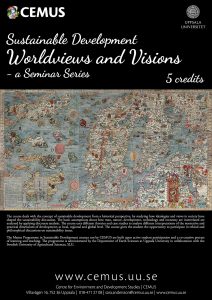CEMUS offers two course packages with courses taught in English
CEMUS offers two course packages, one each semester, for students who want to study sustainability in an international environment. Taught in English, these full-semester packages bring together students from different backgrounds to explore sustainability challenges from multiple perspectives. Through interactive learning and collaboration, students engage with key issues and ideas shaping a sustainable future.
Applied Sustainability Studies, 30 credits
Application at antagning.se »

Start date: 2026/01/20
End Date: 2026/06/05
Language of Instruction: English
Place of Instruction: Uppsala
About the Course Package
The course package of 30 credits offers you the following courses:
Actors and Strategies for Change: From Local to Global Initiatives, 7.5 credits
With a growing number of unsustainable environmental, economic and social trends, how can different actors work for sustainable alternatives? How can we develop capacities, strategies and tactics that achieve lasting and real changes in the local and global world?
To achieve a more vibrant and participatory sustainable development there is a need for great changes, both on the systemic and individual levels. These changes can take the form of fast-moving revolutions, but can also be more reformist initiatives such as social entrepreneurship in businesses or taking part in local politics. In the course, different actors and their strategies for change, globally and locally, are critiqued and analysed through discussions with guest lecturers and in workshops with fellow students. In the last part of the course, you work on an in-depth project, which builds on the discussions and insights gained during the first part of the course.
Technology, Power and the Future of Humanity, 7.5 credits
In what ways can technological innovations contribute to the work with and for sustainability? Which technological and human future scenarios are probable and desirable?
The course introduces idea-historical backgrounds and historical and current examples of the relationships between society and technology. Different themes, such as artificial intelligence, high and low-tech climate technologies, gender and intersectional perspectives, health and access to medical technologies, and social media technologies, among others, are used to highlight and critically discuss how technologies are connected to sustainability.
The course process also focuses on the interdisciplinary dialogue where technological, and natural scientific perspectives meet philosophical, power, political, critical and cultural perspectives. Guest lectures, seminars, literature and examination aim to create reflection and a better understanding of our relationship to our surrounding technological world.
Climate and Leadership: Power, Politics and Culture, 15 credits
Climate change leadership is often mentioned in both news media and by politicians themselves, but what does it entail? What kind of knowledge and skills define a climate change leader and how can they be learned? What kind of political, cultural and psychological resources is lacking in present initiatives?
This course discusses the fundamentals of effective and functioning climate change leadership from a global perspective. Starting from an analysis of how the climate has changed during the planet’s long geological history and how it plays a central role in the life of the biosphere, the course looks at why there are comparatively few effective responses to the issues we are facing.
Then the societal and cultural effects of climate change are discussed, looking at how the use of fossil fuel has transformed modern societies and cultures and taking into account broader perspectives such as ethics, justice or gender. With the knowledge gained during the first part of the course, a framework for a working climate change leadership is critically looked at from a political, power and societal perspective.
